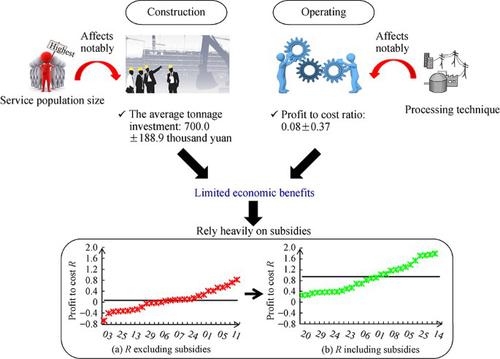Frontiers of Environmental Science & Engineering ( IF 6.4 ) Pub Date : 2020-09-08 , DOI: 10.1007/s11783-020-1325-y Ting Chen , Yingying Zhao , Xiaopeng Qiu , Xiaoyan Zhu , Xiaojie Liu , Jun Yin , Dongsheng Shen , Huajun Feng

|
This study examines the economic benefits of food waste treatment projects in China and factors affecting them. National-level pilot projects for food waste treatment located in 29 cities were selected as samples. The economics of food waste recycling from the investors’ perspective, in terms of investment during the construction phase and cost and benefit during the operation phase, was assessed. Results indicate that the average tonnage investment of food waste treatment projects was RMB 700.0±188.9 thousand yuan, with a profit to cost ratio of 0.08±0.37. This ratio increased to 0.95±0.57 following the application of government subsidies. It highlights the limited economic benefits of food waste treatment facilities, which rely on government subsidies to maintain their operations in China. Further analysis using a multi-factor analysis model revealed that regional location, service population size, processing technique, and urban income exerted varying impacts on the economy of food waste treatment. Population size exerted the highest impact (P = 0.016) during the construction stage, and processing techniques notably influenced the project economy during the operation stage. The study highlights the need to prioritize service population size and processing techniques during economic decision-making and management of food waste recycling projects. The results of this study can serve as a valuable practical reference for guiding future policies regarding food waste treatment and related planning.



























 京公网安备 11010802027423号
京公网安备 11010802027423号